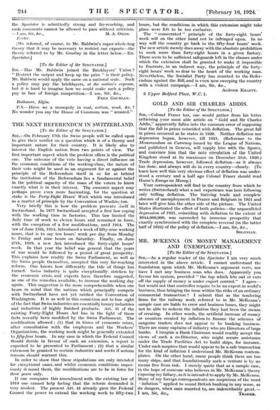GOLD AND SIR CHARLES ADDIS.
[To the Editor of the SPECTATOR.] SIR,—Colonel Fraser has, one would gather from his letter criticising your most able article on "Gold and Sir Charles Addis," apparently fallen into the common error of supposing that the fall in prices coincided with deflation. The great fall in prices occurred as he states in 1920. Neither deflation nor depression began, however, till 1921. (Reference to the Memorandum on Currency issued by the League of Nations, and published in Geneva, will supply him with the figures, and convince him that the note circulation of the United Kingdom stood at its maximum on December 31st, 1920.) Trade depression, however, followed deflation—as it always has done, and always will do in every country—closely. (To learn how well this very obvious effect of deflation was under- stood a century and a half ago Colonel Fraser should read Hume's Essays on Money.)
Your correspondent will find in the country from which he writes (Switzerland) what a sad experience was hers following only trifling deflation. The thriving trade and complete absence of unemployment in France and Belgium in 1921 and later will give him the other side of the picture. The United States illustrated the effect of both policies—the unparalleled depression of 1921, coinciding with deflation to the extent of $944,000,000, was succeeded by immense prosperity that exactly synchronised with the complete reversal (in the latter half of 1922) of the policy of deflation.—I am, Sir, &c.,
SOLOMAN.










































 Previous page
Previous page